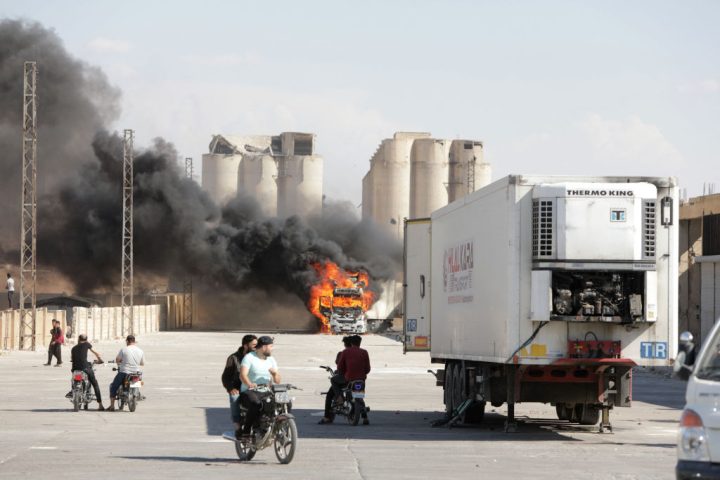A wave of violence targeting Syrian refugees is spreading through Turkey, triggered by allegations of the sexual harassment of a child by a Syrian man in the city of Kayseri. The child, also Syrian, was related to him, according to the authorities. Since the start of the Syrian civil war in 2011, 3.1 million Syrians have been granted temporary protection in Turkey, according to official figures. But now there are growing public demands for them to return to Syria, fuelled by both the governing and opposition parties in Turkey.
As reports of the incident in Kayseri snowballed on social media, mobs combed the streets, attacking and burning houses, businesses, and vehicles they thought belonged to Syrians. In the past week, the violence has spread to other provinces, leading to the death of at least one Syrian.
In both Turkey and Syria, the tension rises and falls, periodically
Far-right groups on Telegram shared videos showing vigilante groups beating and torturing young Syrian men. There are calls for a ‘night of cleansing’, the slogan ‘leave or die’, and appeals to Turks to ‘keep the violence at the highest level’.
‘For days we were afraid to go out,’ said Saad Zalam, a Syrian entrepreneur living in Istanbul. ‘We try to avoid speaking Arabic on the streets. If they ask where we come from, we name a different country.’ The violence is worse, but not new. He is regularly sworn at for speaking Arabic in public, he says.
President Erdogan strongly condemned the latest incidents, which he blames on the opposition. ‘No matter who the perpetrator is, vandalism and setting streets on fire is unacceptable,’ he said.
The president has also tried to downplay the significance of the attacks, blaming a small group of people who will be held accountable. While the number detained by police so far is relatively low, anti-migration sentiment among the Turkish public appears to be surging.
According to official figures, 108,000 Syrians have work permits in Turkey, and another 237,000 have received citizenship. With the worsening economic crisis, anti-Syrian sentiments have been brewing for years. A survey carried out by the Social Democracy Foundation (SODEV) in 2022, showed that 66 per cent of Turkish citizens want ‘Syrians to be sent back to their country’.
The fate of the refugees was a key issue in the 2023 general election, with opposing candidates outbidding each other with promises of how quickly they will send Syrians back. President Erdogan’s final bid was one million within a year. Thirteen months on, Interior Minister Ali Yerlikaya has stepped up deportations. Tens of thousands of Syrians have been expelled so far.
Clashes have also broken out between the Turkish army and their Syrian rebel allies in northern Syria, but it is not clear whether these are connected to anti-Syrian incidents in Turkey. Turkish trucks and armoured vehicles were attacked by the locals and rebels, with Turkish flags burned. Live fire has also been exchanged.
‘Previously, when there were attempts to lynch Syrians in Turkey, these armed groups [supported by Ankara] in Syria did not react,’ says Hediye Levent, a journalist who covers Syria and the civil war.
‘I did not see any reference to the events in Kayseri this time either. The reason behind the tensions is the normalisation process between Ankara and Damascus. These armed groups fear that Erdogan will strike a deal with Assad and they will be left to fend for themselves against the regime and the Russians.’
The normalisation of relations between Ankara and Damascus has been on the agenda for years, strongly backed by Russian President Putin, a key actor in the Syrian civil war. President Erdogan referred to the Syrian president as ‘brother Assad’ before the war. That shifted to ‘Assad the murderer’ after Ankara took part heavily in the Syrian civil war. In recent weeks there was a sudden softening of the rhetoric, with President Erdogan referring to ‘Mr Assad’.
President Assad has repeatedly stated that there can only be talk of normalisation if the Turkish Armed Forces leave Syrian soil and Ankara stops supporting armed rebel groups he regards as ‘terrorists’. In turn, Turkey is unlikely to withdraw from Syria as long as the Kurdish-led Syrian Democratic Forces (SDF) have a strong presence. Ankara regards the SDF as a terrorist organisation and an existential threat to Turkish security. The SDF played a key role in the fight against the Islamic State (ISIS) and is supported by the US.
In both Turkey and Syria, the tension rises and falls, periodically. Syrians in Turkey refuse to voluntarily go back to their country in large numbers, so long as its economy is in ruins and they fear retribution from Assad. But the vast majority of Turks want all the refugees gone. Control over northern Syria is divided between separatist Kurdish forces and the US troops that support them, the Turkish army, rebel forces, various Jihadist groups, and Assad’s army backed by the Russians and Iranians, in a complex web of alliances and mutual hostilities.







Comments